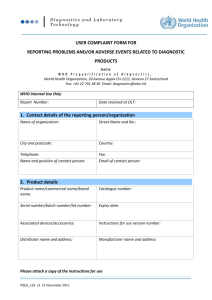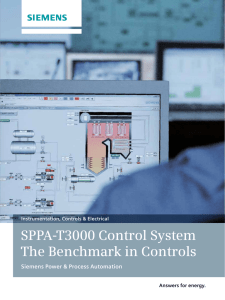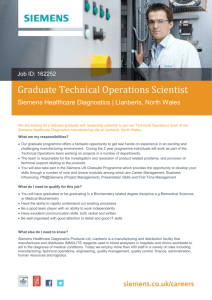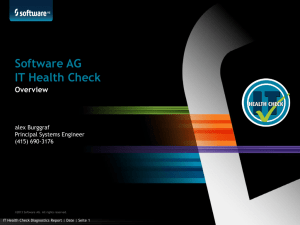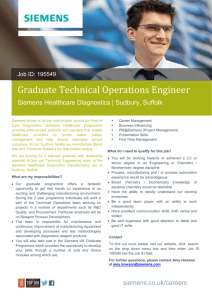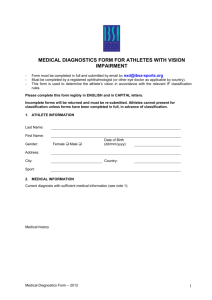The Benchmark in Controls – Technical Highlights Answers for energy.
advertisement
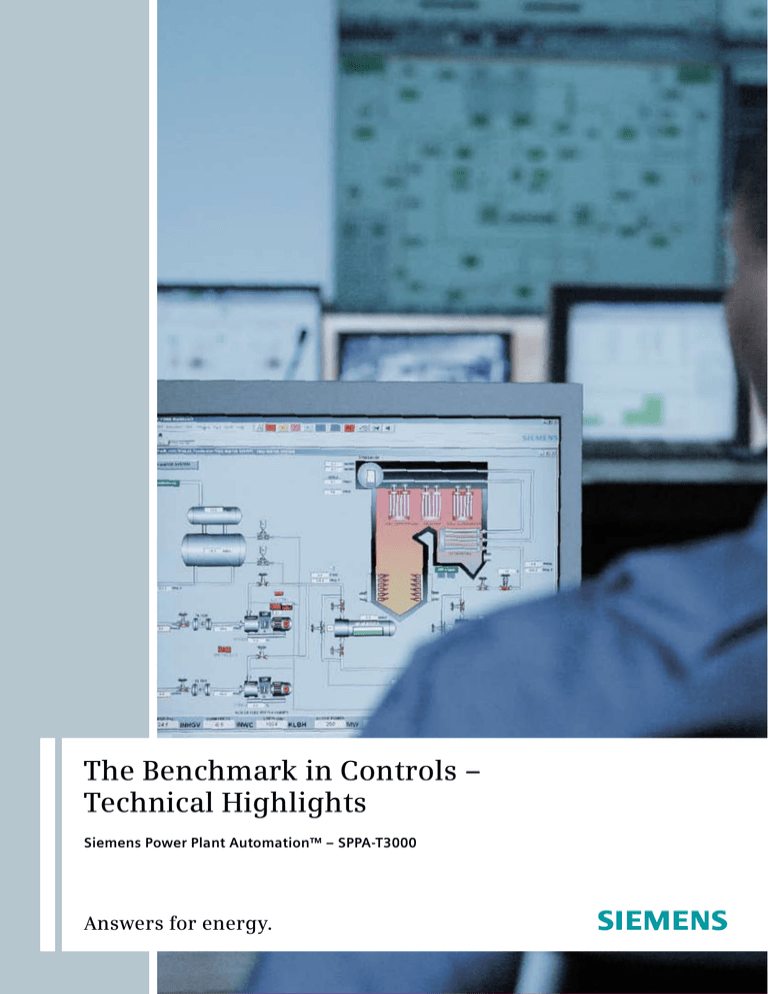
The Benchmark in Controls – Technical Highlights Siemens Power Plant Automation™ – SPPA-T3000 Answers for energy. The benchmark for Distributed Control Systems Developed to meet the demands of power plant owners and operators SPPA-T3000 combines the real-time processing power of traditional Siemens controls with Internet technology. Benefits for owners SPPA-T3000 can provide a competitive advantage by helping to minimize costs and maximize leading-edge technology. nReal time data anytime, anywhere nSingle software system imaging operates in concert with Internet technology nSimplification of system architecture 2 Increased competitiveness Reduced total cost of ownership Easy to learn and use Benefits for users SPPA-T3000 is a reliable and easy-to-use Distributed Control System that can noticeably simplify daily work. The power plant at your fingertips nEasy to operate nEasy to engineer nEasy to diagnose Built for simultaneous online modification HMI and automation functions A perfect solution for reliable production SPPA-T3000 Views at a glance Operation All information available at a glance for reliable plant operation Engineering Integrated engineering for high-speed configuration and modification I&C Diagnostics Built-in I&C Diagnostics without additional equipment for optimized maintenance strategies 4 Alarm Troubleshooting at your fingertips with customized trip reports, alarm summary displays and event reports Archive Archiving for permanent plant change and asset management Field Integrated process interface for field device communication 9 Beyond DCS Integrated platform for power generation management The SPPA-T3000 architecture is based on Web technology. The Web has become a standard method of providing distributed information to many different platforms, and its capabilities are only just beginning to be exploited. In the near future more applications will be integrated into the Web environment, taking further advantage of the ability to access and share information worldwide. SPPA-T3000 has been designed to take advantage of the Web’s current and future capabilities and to provide information easily across a wide range of computing platforms and formats. Service Engineer n Service data Plant Manager Maintenance Engineer n Plant status n Operational statistics Production Planner Power Broker n Reserve load n Production output and forecasting Plant Operator n Plant status Performance Engineer n Historical data For further information: sppa-t3000.pg@siemens.com, www.siemens.com/sppa-t3000 5 SPPA-T3000 system architecture Simplified system architecture eliminates sub-systems SPPA-T3000 combines the reliability of proven, real-time process controllers with new technologies to establish a simple and robust platform. The system is designed to provide real-time data – at the right place, at the right time – to give power plant owners and operators the information they need to make the right decisions, thus improving their ability to be competitive. The SPPA-T3000 process control system is developed based on the needs of today’s power plants with an integrated system architecture for all automation tasks, from engineering and commissioning to operation and diagnostics. This approach results in system architecture that simplifies the system structure and eliminates the need for the required sub-systems as used in traditional control systems. SPPA-T3000 �������� ���������� ������������ ���� � 6 ��������� ������������ ��������������� ����������������� User Interfaces Thin Clients are the window to the process and present information regarding engineering, operation and diagnostics. These are standard PCs running with just a Web browser. User Interfaces The highly available interconnection between all components is realized by a standard Ethernet network with TCP/IP. The access to the process, and connection to the Power Services, are provided by PROFIBUS DP field bus. Power Server Application Server and Automation Servers are used for processing data and real-time execution of the control algorithms. Process Interfaces The interface to the process provides signal conditioning and command output via I/O modules or intelligent PROFIBUS DP field devices. Embedded Component Services™ The software heart of SPPA-T3000 Embedded Component Services™, the heart of the SPPA-T3000 system, give you what you have been looking for: a single user interface for all tasks via intuitive links throughout the entire system. And best of all – you can access it from virtually any Internet-capable computer. The Embedded Component Services™ software ... nintrinsically embeds data into every object nenables different views for different user roles nmakes the information available, at a glance Operation Engineering I&C Diagnostics Alarm Archive Field 7 Easy to use Operation, engineering and I&C Diagnostics with SPPA-T3000 System features designed to make the activities of operators, maintenance personnel and engineers intuitive. This results in an efficient operation and engineering mode to help with sound decision making and flawless change implementation. Non-restricted concurrent workflow down to each single object offers flexibility for any task. Operation nSimple arrangement for all work view displays nEasy access to all information via Point View nEasily created user-specific alarm displays and reports Engineering nSimple, online change configuration right from the Workbench nSimple, straight forward automation and display design nFast on-line undo of last configuration changes with quick roll-back I&C Diagnostics nNo special computer equipment or location for troubleshooting nContext-sensitive online I&C diagnostics information at a glance nComprehensive status of all components from any view 8 Operation The power plant at your fingertips The SPPA-T3000 operator interface is more than just operation and monitoring; the focus is on the management of information and data. All the functions necessary for plant operation – or information access – are comprehensively integrated in the SPPA-T3000 Workbench. Real-time data displays, high-speed and high-resolution process graphics, alarm screens and many other views simplify the review and analysis of live and historical process data. An overview of your plant and business status from virtually anywhere Simplified working procedures SPPA-T3000 offers the unique ability for operators, shift supervisors, maintenance and service personnel to perform their tasks from almost any workplace. The SPPA-T3000 Workbench is designed to integrate all views for plant operations, modifications, tuning, configuration, I&C diagnostics or optimization. Simply start the Workbench from any screen via an Internet browser, and you can access Plant Displays, the Point View, Function Diagrams or Diagnostics View depending on your assigned role and access rights. When plant personnel need comprehensive information about any individual device or function, the Point View offers all information, including real-time values, configuration data, parameters, etc., related to each individual object at the click of a mouse. The Point View not only displays information, but also provides the ability to perform operations, point forcing or modifications from virtually every workplace. The Workbench offers the different views to perform operation, engineering and I&C diagnostics functions. The Point View shows all data and information related to a tag in a clear format. It also provides the ability to navigate to other views. 10 Customized displays for consistent, user-friendly and user-specific operation User-specific desktops tailored to individual roles provide the right view for operation, maintenance, engineering, optimization or management. You can customize the interface to meet your needs. Modifications can easily be made, right from the point where the necessity is recognized, to configure online, change displays and modify settings. ������ ��� �������� ���� ������ ��� ��� ��� � ��� ����� �� � ���� Different styles can be switched – even online. Even different users can display different styles to work according to their own preferences. Accelerated analysis helps ensure trouble-free plant operation Just a mouse click away – one source for plant optimization During critical situations a quick and comprehensive overview is essential. SPPA-T3000 provides a sophisticated alarm system designed to enable operators to control any situation. The alarm information, as well as the way in which it is displayed, is easily customized. The trip report facilitates troubleshooting following a plant incident. Reports can be generated automatically, and can easily be adapted to meet any requirement. Also, generated reports can be stored in standard printer format or in a commercial spreadsheet format, such as pdf or csv, for further processing in an office environment or at a later time. SPPA-T3000 is designed to provide archiving of all information throughout the plant lifetime. Reconstruction and analysis of start-ups, trip events and plant equipment malfunctions are possible. The information can be used for process optimization and improvement of production in alignment with business goals. Applications such as plant management, production planning, expert systems and optimization programs can access the archived data via standard interfaces. This Alarm Sequence Displays (ASD) shows all alarms in a chronological sequence. The plant topology on the left side supports fast navigations and selections. Additionally, the ASD can be displayed in Alarm Point View, which shows one line for all alarm types of an alarm source, including an alarm counter. This screenshot shows the call-up of a stored analog report. The same display enables both the creation and generation of reports. 11 Engineering Immediate online modifications Today plant owners, independent power producers and architect engineers have to manage a huge amount of project data and plant information. To be competitive in the power business, it is essential to increase productivity and to reduce project preparation and maintenance time while minimizing costs. To collect, store and manage information for the whole lifetime of a plant is a challenge easily met by SPPA-T3000, due to its built-in data consistency and integrated engineering concepts. Optimized design workflow The traditional engineering and design process is characterized by a number of sequential steps to implement the control configuration and create the plant displays. The engineering process is performed according to fixed rules and can be less flexible and more time consuming. SPPA-T3000 Traditional DCS Principle differences between the traditional engineering process with separated subsystems and the integrated engineering in SPPA-T3000. SPPA-T3000 offers an integrated engineering approach for the implementation of control configuration and plant display design. Every process element is represented by a related software component that represents not only the traditional automation functionality, but also functionality for operating and monitoring, alarming, engineering and I&C diagnostics. 12 Integrated engineering assigns the respective application data down to a single process object performing control and display information cohesively. The engineering can be optimized and scheduled according to technological plant process require- ments regardless of whether the control logic or the HMI representation is engineered. The engineering process becomes optimized and can be tailored to meet individual business process requirements. High reliability through intrinsic consistency of configuration data Fast online undo of last configuration changes Traditional systems need complex “translations“ or mapping functions that try to achieve data consistency between the different sub-systems. SPPA-T3000’s Embedded Component Services™ provide all I&C functions represented by single software components. Every component includes its data intrinsically. This approach makes initial design and modifications much easier because of a close relationship between the Engineering View and the actual system state. So, there is an intrinsic consistency between the HMI and the control logic. Operation and Engineering are simply different views of the same data. When modifying configurations, an image of the previous version is automatically saved in the system. If the new configuration does not work satisfactorily, the previous configuration can be restored with a simple click. This functionality is independent of redundant or non-redundant Automation Server designs. Roll-back provides a significant advantage for maintenance and service of the system, without the need for processor swap / switch-over. Secure and instant changes under any plant condition SPPA-T3000‘s intuitive, user-friendly graphical interface can allow immediate, cost-effective conversion of design, from task definition to implementation. Plant displays and functional diagrams can be switched to “Configuration Mode“ directly from any user interface and can be modified by any user who has the appropriate access rights. Comprehensive checks and logic testing are possible before activating any changes. Changes can be activated immediately, without further mapping, code generation or download procedures. Faster and easier changes, even for large data volumes A list interface is provided for processing large amounts of configuration data. Simple selection, sorting or handling instructions are executed by this integrated interface. For complex operations, the selected data scope can be exported and processed by conventional methods (e.g., MS-EXCEL) and then re-imported to SPPA-T3000. This window depicts the Spreadsheet Engineering layout which allows a user to edit bulk data. 13 I&C Diagnostics Get a consistent view of your plant data SPPA-T3000 is designed to provide integral, continuous monitoring of system components and equipment. Status overviews are generated of each component in the I&C Diagnostics View.Troubleshooting and reports used for preventive maintenance can help reduce system downtime, optimize the repair and maintenance processes and reduce operation costs. Relevant I&C diagnostics information can be transmitted to the unit and enterprise level and can be used to create or optimize maintenance strategies. Typical Workbench for diagnostics purposes with the I&C Diagnostics View on right bottom, online Function Diagram (left side) and a Faceplate (with buttons and status indications) for operation – if requested. 14 Consistent presentation of I&C diagnostics information with navigation from any view Embedded Component Services™ is the object-oriented basis for the system. The data (I&C Diagnostics, archive, etc.) is merely a view to the object – without any administration, configuration or engineering effort. Navigation is seamless and data integrity is enabled, thus making it easy to use. ����� ���������������� ������������� ���������������� �������������������� ��������� From the central Workbench display the user may call up and navigate to all desired Views that are interlinked with each other, regardless of their functional assignment. Quick and easy fault analysis can support higher system availability Lower operational costs due to optimal I&C maintenance and service support SPPA-T3000 self-diagnostic features and intuitive representation can enable plant personnel to quickly determine where a problem has occurred. With context-sensitive online help, the user is guided and supported when resolving any problem. Fault detection and maintenance efforts can be minimized. Using the Web capability of SPPA-T3000, worldwide remote operations and data access are possible via Thin Clients with standard browsers. Access to all I&C, status and configuration data enables a centralized approach for plant maintenance and service. Networking with experts from headquarters, Siemens hotline or engineering consultants is easily performed and can be purchased or contracted as an option with appropriate security and access protocols in place. 15 Published by and copyright © 2008: Siemens AG Energy Sector Freyeslebenstrasse 1 91058 Erlangen, Germany Siemens AG Energy Sector Fossil Power Generation Instrumentation, Controls & Electrical Siemensallee 84 76187 Karlsruhe, Germany Siemens Power Generation, Inc. Instrumentation, Controls & Electrical 1345 Ridgeland Parkway, Suite 116 Alpharetta, GA 30004, USA For more information, contact our Customer Support Center. Phone:+49 180 524 70 00 Fax: +49 180 524 24 71 (Charges depending on provider) E-mail: support.energy@siemens.com Fossil Power Generation Order No. E50001-W230-A123-X-4A00 Printed in Germany Dispo 054001, c4bs No. 1373, 877 L WS 07081. Printed on elementary chlorine-free bleached paper. All rights reserved. Trademarks mentioned in this document are the property of Siemens AG, its affiliates, or their respective owners. Subject to change without prior notice. The information in this document contains general descriptions of the technical options available, which may not apply in all cases. The required technical options should therefore be specified in the contract. www.siemens.com/energy
